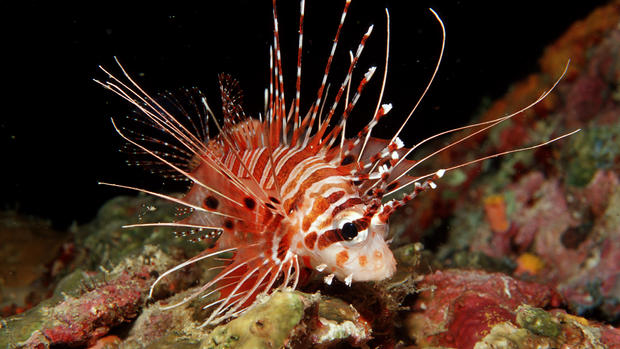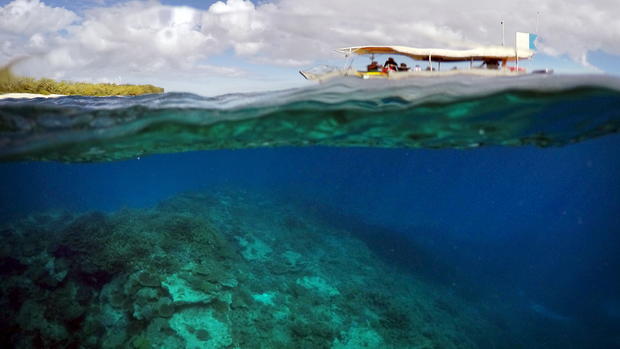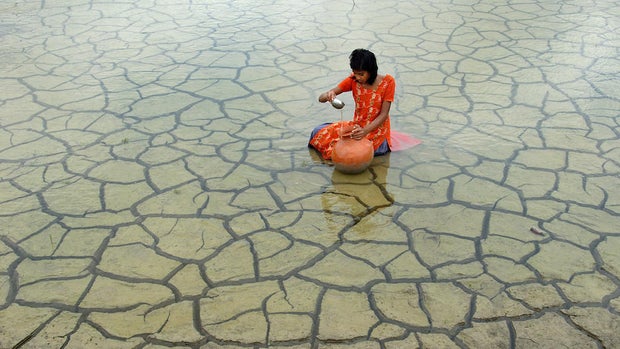Climate change could wipe out all coral reef habitat within decades, scientists warn
In the blink of a geological eye, more than 50% of the world's coral reefs have disappeared — wiped out by factors like warming waters, pollution and overfishing — all within the past few decades. That in itself is disturbing, but new research reveals an even more distressing finding: virtually all of the coral reef habitat on Earth is likely to vanish by the end of this century.
"By 2100, it's looking quite grim," said Renee Setter, a biogeographer at the University of Hawaii Manoa, who presented the new findings at a conference on ocean sciences this week.
The research team simulated future ocean conditions like sea surface temperature, wave energy, acidity, pollution, and overfishing in areas where corals now exist. The team found most parts of the ocean where coral reefs live today won't be suitable habitats for corals by 2045, and virtually no suitable habitats will be left by 2100.
Coral reefs are a vital building block of Earth's oceans systems, nurturing 25% of marine life and supporting local economies worldwide. All told, coral reef benefits are valued at an estimated $10 trillion annually.
The new study is especially disheartening considering recent promising efforts to rehabilitate coral reefs, which have resulted in 60% survival rates of restored corals. The new study means even if coral is restored in the short term, warmer and more acidic oceans due to human-caused climate change may soon overwhelm those efforts.
That's because coral reefs are extremely sensitive to warming waters. An increase of just a couple of degrees in sea surface temperature over a few weeks can lead to mass bleaching, a phenomena where coral turns white as it expels the symbiotic algae it relies on for survival and for its vibrant colors. Bleaching itself does not kill, but it weakens corals, making them more susceptible to disease and death.
Climate change is a double whammy for coral, due both to ocean heating and acidification from dissolved carbon dioxide. The world's official climate body, the United Nations' International Panel on Climate Change, projects that coral reefs will decline by 70% to 90% in the next couple of decades and by 99% percent if global warming reaches 2 degrees Celsius above pre-industrial levels.
In recent decades, tropical sea surface temperatures have increased by more than 1 degree Fahrenheit and there has been a significant increase in marine heat waves, which are responsible for mass bleaching events like the one that devastated the Great Barrier Reef in 2016.
Because of the burning of fossil fuels, carbon dioxide levels in the atmosphere have risen by nearly 40% since the mid 1800s. One quarter of the carbon dioxide is absorbed by the ocean, and as a result the oceans are becoming more acidic. The higher acid levels dissolve shells of marine life and stunt coral building.
Current trends provide little reason for hope, but Setter points to great research being done around the world trying to identify the most hardy corals through assisted evolution, as a last-ditch effort to save coral reefs from vanishing.
"I believe there is hope that they will be able to identify corals that may withstand climate change," said Setter. "The question becomes if they would be able to replenish and restore coral to the same extent that the ecosystem exists today. Coral restoration is a slow and time consuming process."
Dr. Mark Eakin, coordinator of NOAA's Coral Reef Watch Program, shares Setter's concerns. He says there's evidence that coral reef restoration, like transplanting corals adapted to higher temperatures, is working. But he believes the more resilient coral won't likely be able to compete with the pace of climate change.
"It's unlikely the adapted corals will be able to keep up with projected increases in the frequency and intensity of marine heat waves," Eakin said.
Both sea surface temperatures and ocean acidity are projected to increase markedly in the coming decades. And while combating pollution and overfishing is important, Setter says the main issue for coral is a warmer and more acidic ocean.
"At the end of the day, fighting climate change is really what we need to be advocating for in order to protect corals," she said.
Eakin puts it bluntly: "The most important point to make is that all the restoration and assisted evolution work will be wasted if we don't move to carbon-free energy. That means bringing emissions to zero and mechanisms to remove excess carbon from the atmosphere."






